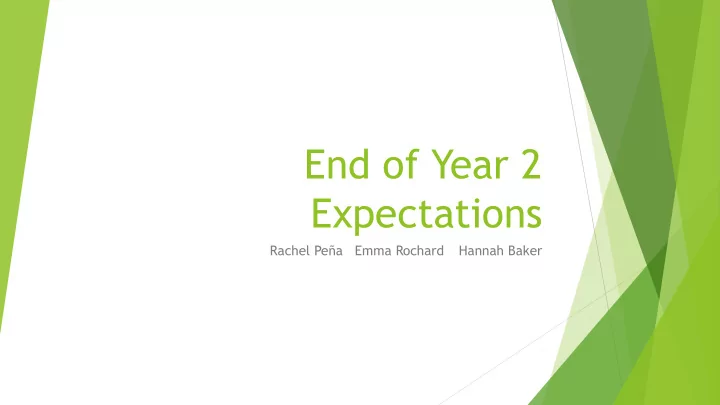

End of Year 2 Expectations Rachel Peña Emma Rochard Hannah Baker
Focused on secure understanding of key concepts National Practical, problem solving, talk and Curriculum - pair work What it looks Application in real/different like in our contexts and linked to topics KS1 This leads to a deep understanding of all subjects.
Reading Reading age appropriate text: Enjoyment of reading Read with fluency and expression – re-reading Discuss the meaning of new words and sound out unfamiliar words confidently Check that what has been read makes sense and self correct reading where necessary Making inferences using evidence in the text Make predictions about what might happen next in a story Making links between different books
Writing Focus on writing that is accurate and coherent. Develop stamina for writing in different contexts/genres Write coherently and effectively – structure, grammar and vocabulary choices Accurate punctuation - full stops, question marks, exclamation marks and commas in lists Accurate spelling – using phonics, spelling patterns and common exception words Form letters correctly and begin to use joins between letters Write longer sentences using coordinating and subordinating conjunctions, such as ‘and’,’ but’, ‘if’ or ‘because’ Use the present and past tenses correctly in writing Proof-read and edit their own writing
Working towards
Expected Standard
Greater Depth
Spelling Year 2 focus on suffixes and spelling patterns plus lots of common exception words. Practice, practice, practice!
Practical Guide - Spellings It is DEFINITELY OK to spend lots of spelling Repetition is very practice time Rainbow writing effective! copying the spelling, not just testing it Mnemonic- because- Look, say, cover, Big Elephants Can’t write, check Always Use Small Exits
Maths During Key Securing a good understanding of place value and recognising number bonds to 20 Stage 1, there is a Adding and subtracting numbers mentally and using big focus written methods, including two-digit numbers on Learning the multiplication and division facts for the 2x, developing 5x and 10x tables basic Solving problems including + - x and ÷ symbols number skills by: Practising these skills frequently will help children’s mathematical thinking throughout school.
Practical Guide – Maths Lots of practice with tens and ones – you can use pencils and lego bricks to replicate the tens and ones we use in school Using facts you know to CALCULATE rather than to COUNT e.g. 13 + 9 is like 13 + 10 Addition and subtraction Column method including carrying and borrowing Multiplication and division Arrays Times tables! Problem solving Understanding what you are being asked Working out what to do first/next and checking it makes sense
End of Year Expectations As in previous years, Year 2 assessment will be a combination of teacher judgement and testing. Children will be assessed against three standards: Working towards the expected standard Working at the expected standard Working at greater depth within the expected standard
End of Year Tests – May At the end of Year 2, all children will sit the National Curriculum Tests for Key Stage 1. These will be for the subjects: Maths – Arithmetic test and reasoning tests English – Reading tests Grammar, punctuation and spelling tests These will be marked on a National Scaled Score. A pupil who achieves the national standard will have demonstrated sufficient knowledge in the areas assessed by the tests. This will mean that they are well placed to succeed in the next phase of their education.
The tests will take place during the month of May and will be done in the Key Stage 1 unit. These tests contribute to the end of year End of Year teacher assessment, they do not supersede it. However they are an important part of Tests – May our assessment at the end of Key Stage 1. It is important that your children are in school for these tests as they really do allow them to demonstrate their learning for the year.
End of Year Tests - Maths This will include a short arithmetic test of around 25 questions, and a second paper of broader mathematics which will last around 35 minutes. Arithmetic questions examples: 89 + 10 = …. + 5 = 9 87 − 40 = 8 x 10 = 2 x 0 = 35 ÷ 5 = ¼ of 20 =
End of Year Tests - Maths Reasoning questions examples:
End of Year Tests - Maths Reasoning questions examples:
End of Year Tests - Maths Reasoning questions examples:
End of Year Tests - Maths Reasoning questions examples:
End of Year Tests - Reading Text level example:
End of Year Tests - Reading Question examples:
End of Year Tests - Reading Text level example:
End of Year Tests – Punctuation and Grammar Question examples:
End of Year Tests – Punctuation and Grammar Question examples:
End of Year Tests – Spelling Question examples: baking knew model whale
How you can help Practice, practice and more practice! Reading at home • Book band books, library books, magazines, non-fiction books – anything! • Continue to read to your child to develop pleasure for reading and comprehension skills • Don’t be afraid to re -read the same book to develop fluency and understanding.
How you can help Practice, practice and more practice! Maths • Number bonds and times tables • Practice with tens and ones – making, comparing, adding, subtracting numbers • Ask your children to teach you how they do calculations • Telling the time, using money and describing 2D and 3D shapes and fractions
How you can help Practice, practice and more practice! Writing • Insisting on best handwriting whenever they write – thank you letters, homework etc • Spellings practice • Reading, making up stories, talking together – talk for writing
Thank you for listening! Any questions please catch us at school, use ClassDojo or email us rpena@cwr.pmat.academy erochard@cwr.pmat.academy hbaker@cwr.pmat.academy
Recommend
More recommend